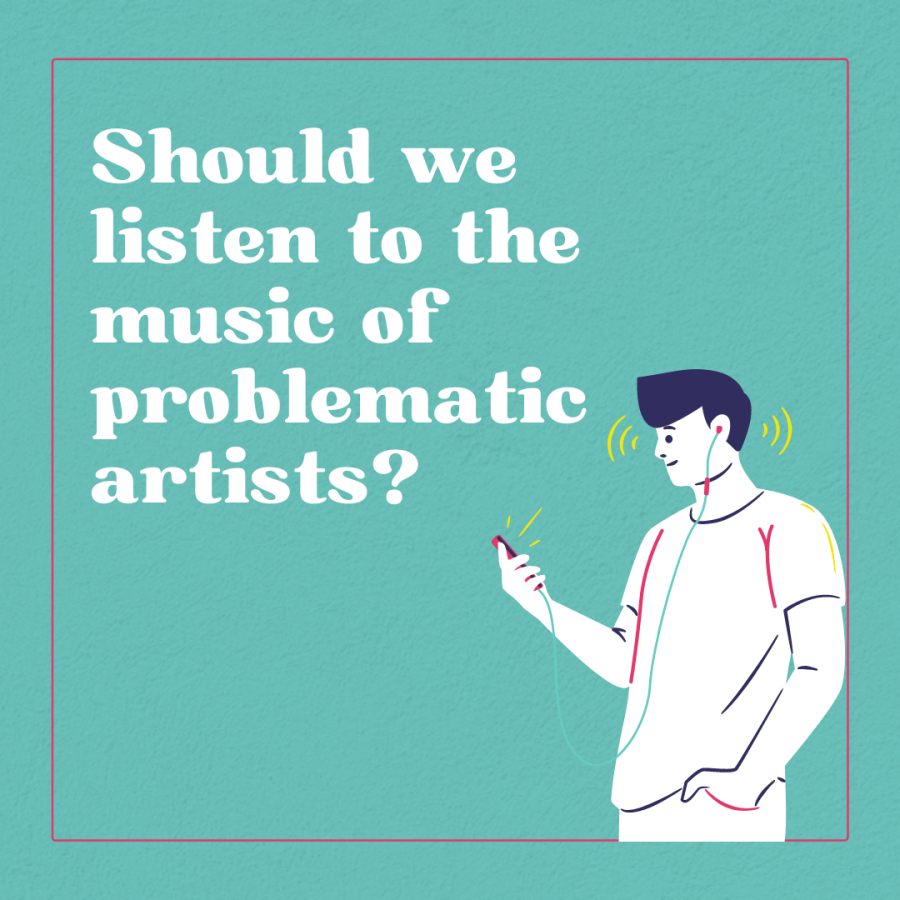Should we listen to the music of problematic artists?
February 9, 2022
There are many musical artists, especially in the modern day, that have been found to be responsible for ethically questionable acts.
Such artists also produce wildly popular music and legitimately good works—after all, one must have a certain amount of renown if their public image can be affected.
We are all just people, after all. It is not right to place these figures on a pedestal or expect more from them than we do from anyone else. However, as individuals in the spotlight, artists need to be kept accountable, since many of them have influence over the public as role models.
The dilemma on how to treat the art and the artist is something a lot of people consider. This rose in the past year with high-profile cases like Sia’s controversial depiction and treatment of the autism community and Travis Scott’s alleged negligence during his Astroworld tour that ended with an estimated 10 people dying during his concert in Houston, Texas.
What constitutes a “problematic” artist is different for everyone. For some, it is a disagreement with personal beliefs like religion or politics, but for most, it is a legal problem like criminal charges. Throughout history, there have been countless famous musicians who have committed crimes or engaged in ethically questionable behavior.
According to a Vice article, John Lennon was open about his violence against the women in his life. Rock and roll pioneer Chuck Berry was reported by Rolling Stone to be charged with child abuse, sexual abuse, and possession of marijuana multiple times. Successful R&B artist R. Kelly was convicted as a sexual predator in 2021.
The range of offenses is large, and some offenses may not be considered offenses at all.
Acclaimed singer Sia faced much backlash and controversy in Feb. 2021 with the release of her musical film Music, which depicts a young autistic woman’s daily life. People of the autism community voiced their issue with how the depiction was stereotypical, inaccurate and more akin to a parody than tribute. They questioned why Sia did not hire a dancer from the community to truly represent the group, instead casting neurotypical Maddie Ziegler, who would not have had their experiences.
Sia faced no legal action due to the criticism, but experienced loss of face in many prominent media channels. A review from The Guardian described that Music has “a cheap, oppressive quality” that “manages to both underestimate autistic people and infantilize them.”
In another case, popular rapper and singer Travis Scott came under scrutiny for his response, or lack of, during his recent Astroworld concert in Houston, Texas. The crowd of 50,000 spiraled out of control, initially spurred by the rapper’s provocations, and resulted in chaos that killed 10 people. The case is currently under investigation by the FBI.
Some “problematic” artists may face a different degree of backlash.
West Ranch junior Jaena Danaram expressed, “Lana Del Rey is controversial because some people say that her music romanticizes domestic abuse. I believe all music depends on the listener’s interpretation, but I think her music is just a way for her to deal with her emotional trauma by turning it into art. She makes really good music.”
I personally believe you can listen to music regardless of controversy, but you cannot separate the product from the artist, because art is a very personal representation of the creator’s identity. In terms of technique, it is irrelevant whether an artist is a morally questionable person or not, because their character does not affect the degree of skill they have in their field.
However, this observation does not lead closer to finding an answer to the question.
Keep in mind that you could be seen as supporting or condoning an artist’s acts and what they represent when you listen to their music. Consider if you really want to be perceived that way. The most important factor is how much you care about the artist’s “offending” beliefs or actions in comparison to how much their music matters to you. I think it is possible to dislike an artist while appreciating their work. No one is morally obligated to be a crusader of justice or boycott music.
Personally, if I find an artist to be an individual that I fundamentally and morally cannot support, their music loses its appeal. I end up thinking about the aspects of their actions that bother me whenever their music plays. Perhaps others feel the same way.
Most of the time, though, the so-called “offense” of an artist is minor according to my standards and is overlooked.
If you don’t mind reconciling the image of the artist with their work, but do not want to contribute support through profits, do not listen to their music in a way they can benefit. Assuming the artists themselves are popular enough to profit from their work, they make money from the general public through official uploads on media platforms (streaming), merchandise, social media traffic and live performances.
Listen to unofficial uploads that don’t allocate profit for the creators, like lyric videos. Avoid interacting with posts on social media. As long as you refrain from actively buying official merchandise, endorsed products or show tickets, you are not effectively supporting an artist.
There are lots of talented people out there to listen to without feeling guilt or conflict. This isn’t a cure-all answer. Truly, it’s situational and relies on your own personal judgement because it reflects your personal beliefs. But this criteria can give you a way to sort out how you feel.
Happy listening!


